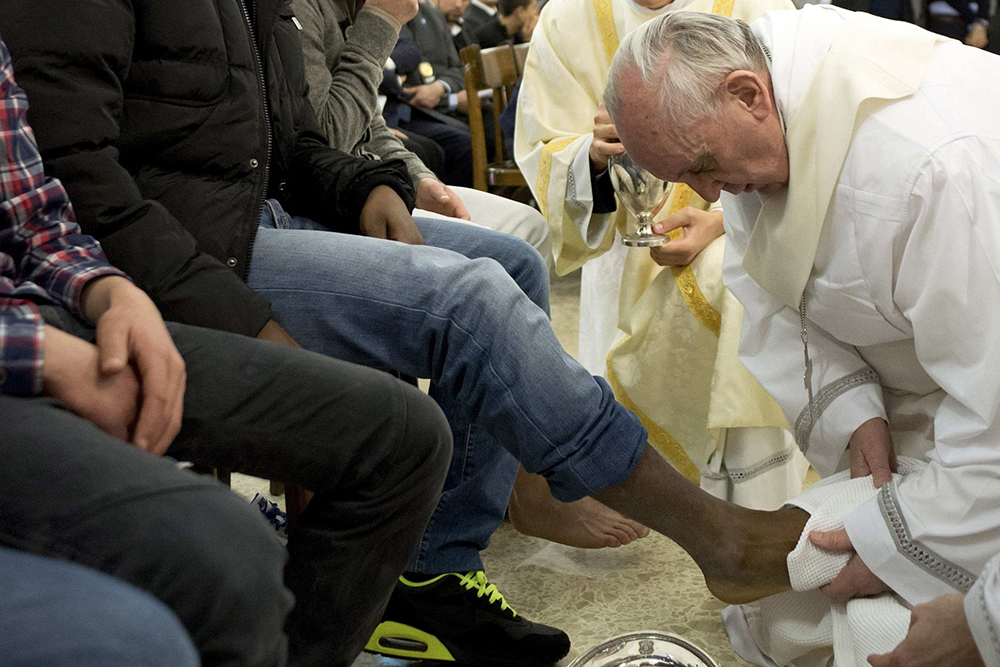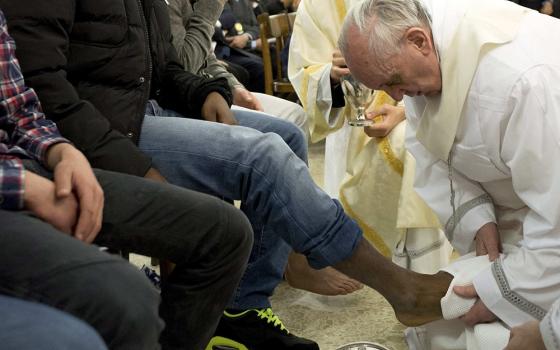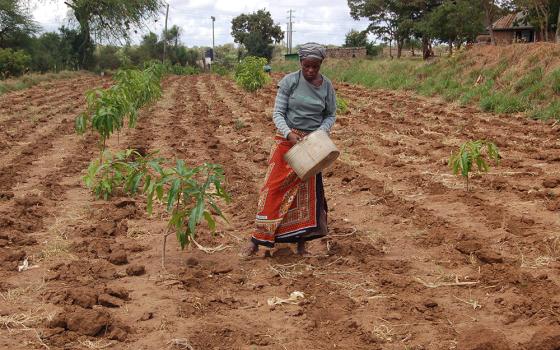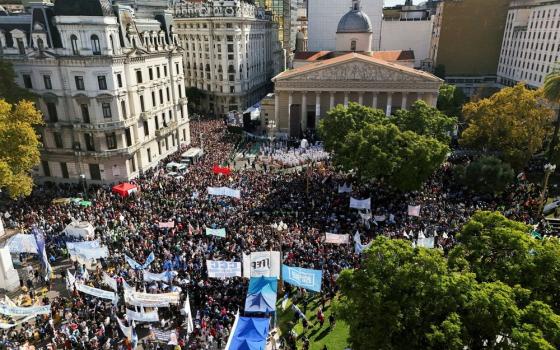
Pope Francis washes the foot of a prison inmate during the Holy Thursday Mass of the Lord's Supper at Rome's Casal del Marmo prison for minors March 28, 2013. (CNS/L'Osservatore Romano via Reuters)
At the end of his life, Pope Francis made one last symbolic gesture: he emptied his personal bank account to donate 200,000 euros to the prisoners he had long championed.
It was a final act of love toward those he had called his "brothers and sisters behind bars," an act that Bishop Benoni Ambarus, auxiliary Bishop of Rome and director of the Office for Prison Pastoral Care, said captures the very essence of Francis' pontificate.
Ambarus has witnessed firsthand the pope's commitment to the incarcerated. Even as his strength visibly declined, Francis refused to abandon the most forgotten members of society during Holy Week.
"A few days ago, the Holy Father dragged his body to Regina Coeli," Ambarus said in an April 23 interview with the Italian daily LaRepubblica, referring to the pope's last visit to the historic Roman prison on Holy Thursday, April 17.
Francis' bond with the prison population was a core feature of his ministry. From the start of his papacy, he made headlines by washing the feet of inmates on Holy Thursdays and calling for greater compassion within justice systems. But Ambarus said the pope's heartfelt appeals for prisoners often fell on deaf ears. Institutions, he said, "did nothing to give even a small signal" in response to Francis' call for action.
Advertisement
In his final months, Francis pushed even harder for symbolic and concrete gestures to bring hope to the incarcerated. One of the most significant achievements was the opening of a Holy Door at the Rebibbia prison — a rare privilege previously reserved for the Vatican's own St. Peter's Basilica. The idea, born from the inmates themselves, was enthusiastically embraced by Francis as a powerful way to "reignite the light" within prison walls.
The Holy Door at Rebibbia sparked a broader pastoral movement, where groups of volunteers, priests and religious sisters now regularly enter the prison to join the prisoners in Mass and in moments of reflection. Each visit, Ambarus said, has been carefully prepared to ensure participants understand the profound meaning behind their presence: not to observe prisoners like exhibits, but to share in their humanity and struggles.
Despite these efforts, the systemic changes Francis longed for — such as sentence reductions or more humane detention conditions — largely failed to materialize. The pope had even proposed modest measures: small remissions of prison time, a month or two, to signal trust in the possibility of redemption.
Such symbolic acts, Ambarus said, could have reignited hope. Instead, the lack of any governmental response left a sense of bitterness among prisoners, who had seen in Francis their only real advocate.
These inmates saw the pope's death not just the passing of a religious leader but as the loss of a father figure. As a symbol of their gratitude and grief, they gave Ambarus with a letter and a flower to be placed on the pope's tomb.
The Holy Door at Rebibbia sparked a broader pastoral movement, where groups of volunteers, priests and religious sisters now regularly enter the prison to join the prisoners in Mass and in moments of reflection.
Beyond the official ceremonies he attended at prisons, Francis' care for prisoners was profoundly personal. When asked to support prison ministry initiatives financially, even as Vatican resources dwindled, he did not hesitate to dip into his personal savings. "Don't worry, I have something in my account," he told Ambarus, before transferring 200,000 euros for the needs of the incarcerated — money he might have kept for his own use in his final days.
A poignant detail revealed after his death showed that Francis' burial would be paid for by a benefactor. Having given everything to others, he left no money behind in a final demonstration of solidarity with the poor and marginalized.
The prison work Francis inspired continues, albeit with new challenges. The pastoral ministry that grew around the Rebibbia Holy Door now involves about 50 people joining the prisoners twice a month.
"Being there, during and after detention," Benoni told the Italian newspaper, is often the most powerful gift one can offer. Too many inmates, he said, go through their entire sentences without ever receiving a visitor. "Small gestures — a letter, a conversation, practical help with shoes or clothing — can reignite the human dignity that prison walls so often extinguish."









